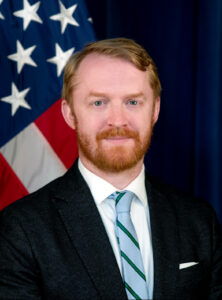
If the Office of Advocacy’s Deputy Chief Counsel could say one thing to all small business owners, it would be a simple reminder: “Do not underestimate the impact of your voice. You are not alone in this.”
Small business ownership is one of the largest communities an American can be a part of, with about 98 percent of all businesses in the U.S. classified as small businesses.
Chip Bishop is new to Advocacy but quite familiar with the small business economy. At 10 years old, he landed his first job at a Chicagoland bakery, thanks to his sociable father. He joked about leaving the younger Bishop to work off the check, and the owner responded that the workday started promptly at 4 a.m. The pair showed up the following morning.
“I’m not sure they expected me,” Bishop shared with a light chuckle. “But I was there, knocking on the door for an hour, so they gave me things to do. I started with baking cookies, graduated to brownies, and then I finally made it to the bagel machine.”
He held the job for about two years, earning $5 per batch and a first-hand look at what it takes to maintain and sustain a small business in the community.
Instead of high school, he attended a local community college and worked in the warehouse of a local publishing company assembling book collections, promotional materials, and handling return inventory. Shortly after his time there, he was granted a scholarship to attend Carthage College. With years of college credit already under his belt but only four years of education funding, Bishop decided to triple major, studying Economics, International Political Economy, and Communications.
“I liked everything I studied, but I realized that economics provided the best toolkit for me to understand more about the world and how it works,” Bishop explained. “I’ve always preferred to have a job where I’m learning.”
Armed with that internal understanding, he earned his master’s in economics at George Mason University and began his career at a DC-area think tank focused on public policy. His path continued to jobs at the Department of Transportation as an economist, the Office of Management and Budget as an examiner, the Department of Labor as a senior policy adviser, and U.S. Immigration and Customs Enforcement as the chief economist. All this regulatory experience culminated with him landing at the Office of Advocacy.
“I believe my experience is well-suited to enhance Advocacy’s reach,” Bishop said. “I’ve been honing my skills for more than a decade, and I’m familiar with the work produced in Advocacy. I’ve done analyses and this sort of work for other agencies, so being able to apply this experience to Advocacy’s government-wide scope is something I knew I wanted to be a part of.”
As he settles into the deputy chief counsel’s chair, each of his priorities includes the foundation of Advocacy’s primary mission: Amplifying the voice of small businesses.
“I want us to ensure that we are practicing what we preach,” he explained. “We are the voice of small businesses in the regulatory process, and that starts with us listening to those voices ourselves. That means being even more accessible. That means continuing to be in the field where business owners are. That means truly listening and acting on the pain points they share with us.”
In addition, Bishop is impressed by Advocacy’s research portfolio, adding that it provides a wide range of insight and relevant data that is not always easy to find or access for most. He hopes to provide more structure and order to how Advocacy engages with small business owners by not only fostering new connections but by developing more ways to sustain and support these connections over time.
“Small businesses are truly at the forefront of the economy—they are the ones experimenting with new ideas and exploring new methods of working. Being smaller and more nimble grants them the opportunity to be more driven by their ideas and passions, which allows innovation – and the American economy at large – to flourish.”
